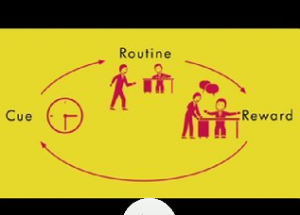Any act often repeated soon forms a habit; and habit allowed, steadily gains in strength. At first it may be but as a spider’s web, easily broken through, but if not resisted it soon binds us with chains of steel. ~ American theologian Tryon Edwards (1809–1894)
 How much of what you do is wise? Most of the choices we make each day feel like well-considered decisions. In reality, ingrained habits drive us to act. (Image from The Power of Habit.)
How much of what you do is wise? Most of the choices we make each day feel like well-considered decisions. In reality, ingrained habits drive us to act. (Image from The Power of Habit.)
Research has shown that the average person has approximately 40,000 thoughts per day, but 95% are the same ones experienced the day before. Other studies support the notion that 40% of our daily actions are based on habits and routines, not newly formed decisions.
Our habits—what we say, eat and do, and how we organize our thoughts and work routines— have an enormous impact on our health, productivity, financial security and happiness.
People can be highly motivated to achieve goals and make changes in their lives, yet be firmly entrenched in habits.
In the last two decades, scientists have begun to understand how habits are formed, how they work and, more importantly, how we can change them. As New York Times staff writer Charles Duhigg reveals in The Power of Habit: Why We Do What We Do in Life and Business (Random House, 2012):
- Before Pepsodent entered the market in the early 20th century, only 7% of Americans had a tube of toothpaste in their medicine chests. A decade later, the number had jumped to 65%, thanks to Claude C. Hopkins’ legendary advertising campaigns. The tooth brushing habit was firmly established.
- Procter & Gamble turned a spray called Febreze into a billion-dollar brand by taking advantage of consumers’ habitual urge to “breathe happy” and eliminate odors.
- Alcoholics Anonymous reforms lives and enables people to live free from powerful addictions by redirecting self-destructive habits into constructive routines.
- By changing one small keystone habit (like safety precautions or tracking in a journal), individuals and companies can influence everyday routines, leading to widespread results.
This 825-word article summarizes research on how habits are formed and how they can be changed into positive routines for both individuals and organizations.
________________________________________
This is a brief synopsis of an 825-word article and Article Nuggets,* suitable for coach newsletters and blog posts. It is available for purchase with full reprint rights, which means you may put your name on it and use it in your newsletters, blogs or other marketing materials. You may also modify it and add your personal experiences and perspectives.
The full article talks about:
- Habits Are Neural Connections
- Habit Loops: Cue => Routine => Reward
- The Golden Rule for Changing Habits
————————————————————————————
Request This Content:
Send us an email and let us know if you’d like to receive this article, Article Nuggets* or Newsletter (as applicable.) It is available in the following formats:
1. The Amazing Power of Habits – 825-word Article with Full Reprint Rights, $57 –
2. The Amazing Power of Habits – 3-Article Nuggets* with Full Reprint Rights, $64 –
*Article Nuggets: The same article broken up into 3 blog-style sections suitable for a series of blog posts or shorter newsletter articles, with links and personal pronoun “I.”